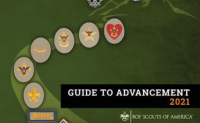 The rise over the last several years of social networking in the form of online services like Facebook, Twitter and Instagram have revolutionized the way we communicate. Regardless of where we are in the world, we can keep in touch with our network of friends back home or anywhere else.
The rise over the last several years of social networking in the form of online services like Facebook, Twitter and Instagram have revolutionized the way we communicate. Regardless of where we are in the world, we can keep in touch with our network of friends back home or anywhere else.
Networking is not new to the digital age, though. Making friends out of business associates is an art and an essential skill. Success in business is largely tied to having a network of people you can call on – and who can call on you – when the need arises.
In fact, who you know, and the connections you make, is every bit as important as what you know – and in many cases, even more so.
As a Scouter, there’s another sort of social network that you should nurture – your network of Scouting friends and contacts.
Why do you need a Scouting network? Simply put, it’s because you should never go it alone. Trying to do everything yourself is like reinventing the wheel at every turn. There’s simply no reason to work that hard when resources are available.
So who is in your Scouting network?
- Well, for starters, there’s the people in your own unit. Your fellow adult volunteers and parents of your Scouts can be resources when it comes to being able to reach out and get things done. And if not, they most likely do know someone who can help.
- Your commissioner and district staffs – the volunteer committee and professional Scouters. They can help with procedural matters and other questions about your program. The Scouters you meet at Roundtable can be good resources for program ideas and other kinds of help.
- Your unit’s chartered organization can be a huge untapped resource. Your chartered organization representative can be a gateway to the people who can make the contacts you need.
- Are you a member of a service club – like the Rotary, Kiwanis or Jaycees? Or are you chartered to one?There’s another group you can reach out to. You probably know many community leaders through your connections, and if you aren’t a member of one, you probably know someone who is.
- A very important person is the principal of the school you serve. You’ll need the principal’s cooperation to recruit as well as to use the building facilities for your meetings. Ask about doing a service project for the school once or twice a year, such as a grounds cleanup, helping with a special event or providing a flag detail for school board or PTA meetings. And don’t forget the office staff at holiday time – any popcorn you didn’t sell will make a fine gift for everyone to share.
- If you have a community newspaper, get to know its editor. You’ll want to make that connection in order to submit stories about what your unit is doing. Most small papers welcome submitted stories, because that is content they don’t have to report and write themselves. You’ll be doing the editor a favor by providing news for his paper, and he’ll be helping publicize your unit.
- Other people who are good to know are your local elected officials – the mayor and councilpeople or aldermen, school board members, township supervisors or county commissioners. And it doesn’t hurt to make friends with your state representative and senator. An e-mail every few months to let them know what civic-minded things your unit is up to would be appreciated, such as a report on your recruiting, food drive and advancement. Invite them to big events such as your Blue & Gold banquet or court of honor. It may be a long shot, but you might be surprised to have them attend – and your Scouts will get to meet them in person.
- Business owners and managers should be in your network, too. They might let you put a poster or display in their store window, help you with discounts on purchases or offer you space to sell popcorn or other fundraising items. The grocery store manager might be more willing to cooperate with bottle drive returns if you get to know him or her ahead of time and ask permission.
By reaching out beyond your unit, getting to know new people and leveraging the friends you’ve already made, you can help further the aims of Scouting in your community.
Image: David Castillo Dominici / freedigitalphotos.net
This post first appeared on Bobwhite Blather.




